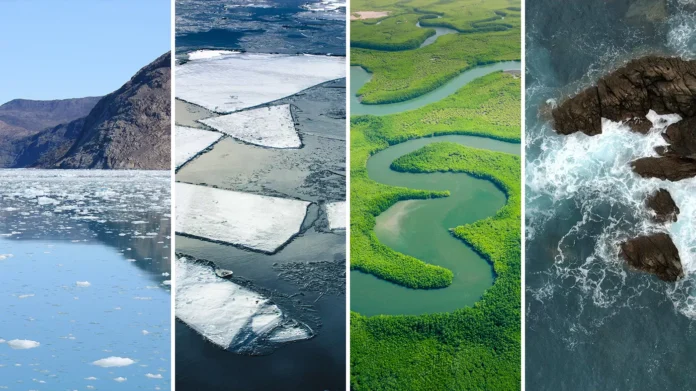Four Key Pillars of the Global Climate Melting in the Heat of Rising Fossil Fuel Emissions: A Wake-Up Call for Humanity
The Earth’s climate has always been in a state of constant change, but in recent years, a new study has shown that four key pillars of the global climate are rapidly melting under the heat trapped by rising fossil fuel emissions. These structures, which have been relatively stable for centuries, are crucial to maintaining the balance that has allowed human civilization to thrive. The consequences of their decline are far-reaching, and it is essential that we take immediate action to address this pressing issue.
The first pillar is the ice sheets of Greenland and West Antarctica. These massive sheets of ice, which cover vast areas of land, are melting at an alarming rate. The study found that Greenland’s ice sheet lost an average of 286 billion tons of ice per year between 1993 and 2016, while West Antarctica lost an average of 127 billion tons per year. This is a significant increase from previous estimates and is a clear indication of the impact of rising temperatures on our planet.
The consequences of these melting ice sheets are dire. As they melt, sea levels rise, threatening coastal communities and low-lying islands. This not only puts millions of people at risk but also has a devastating impact on marine life and ecosystems. The loss of these ice sheets also contributes to the warming of our planet, as the reflective white surface of the ice is replaced by dark ocean water, which absorbs more heat from the sun.
The second pillar is the Amazon rainforest, often referred to as the “lungs of the Earth.” This vast expanse of trees plays a crucial role in regulating the Earth’s climate by absorbing carbon dioxide and releasing oxygen. However, deforestation and the burning of fossil fuels have led to a significant increase in carbon dioxide levels, which is causing the rainforest to dry out and become more susceptible to wildfires. In 2019, the Amazon experienced record-breaking wildfires, which released an estimated 195 megatons of carbon dioxide into the atmosphere. This is a concerning trend that must be addressed if we are to protect this vital pillar of our global climate.
The third pillar is the Atlantic currents that warm Europe and the eastern coast of North America. These currents, known as the Atlantic Meridional Overturning Circulation (AMOC), play a crucial role in regulating the Earth’s temperature by transporting warm water from the equator to the north. However, the influx of freshwater from melting ice sheets and increased precipitation is disrupting this process, causing the currents to slow down. This could have a catastrophic impact on global weather patterns, leading to more extreme weather events and potentially plunging parts of Europe into a mini-ice age.
The fourth and final pillar is the coral reefs, which are home to a diverse range of marine life and play a vital role in maintaining the balance of our oceans. However, rising ocean temperatures and acidity levels, caused by the absorption of carbon dioxide, are causing widespread coral bleaching and death. This not only affects the delicate ecosystem of the reefs but also has a ripple effect on the entire marine food chain. If we do not take action to reduce our carbon emissions, we risk losing these magnificent structures that have been a part of our planet for millions of years.
The findings of this study are a wake-up call for humanity. We cannot continue to ignore the impact of our actions on the environment. The four pillars of our global climate are interconnected, and the decline of one will have a domino effect on the others. We must take immediate and decisive action to reduce our carbon emissions and transition to renewable energy sources. This is not just a responsibility, but a moral obligation to protect our planet for future generations.
Thankfully, there is still time to make a positive change. Governments, corporations, and individuals all have a role to play in mitigating the effects of climate change. We must invest in sustainable technologies, promote conservation efforts, and make conscious choices in our daily lives to reduce our carbon footprint. Every small action counts, and together, we can make a significant impact.
In conclusion, the four key pillars of the global climate – the ice sheets, the Amazon rainforest, the Atlantic currents, and the coral reefs – are melting in the heat trapped by rising fossil fuel emissions. This is a wake-up call for humanity to take immediate action to protect these vital structures and preserve the delicate balance of our planet.

